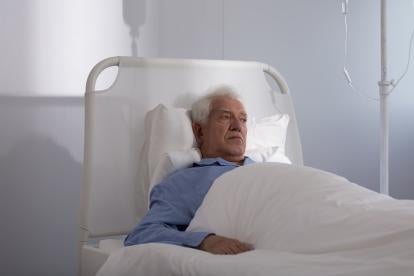Has visitation to nursing homes been limited during the COVID-19 outbreak?
Yes. CMS and CDC recommend nursing homes restrict visitation of all visitors and non-essential health care personnel. For more information, click here.
How should nursing homes handle end-of-life situations?
Certain compassionate care situations, such as an end-of-life situation, are exempt from the nursing home visitor restrictions. In those cases, visitors must be limited to a specific room only. Additionally, nursing homes should require visitors wash their hands and wear facemasks when necessary. Nursing homes should decide on a case-by-case basis how to handle visitation for end-of-life situations. Be sure to screen all visitors related to the end-of-life care, including clergy and bereavement counselors. If a visitor has any symptoms of the virus, they should not be permitted to enter the facility at any time (even in end-of-life situations). For more information on how to handle compassionate care situations, click here.
Considerations for determining an end-of-life situation?
The Ohio Department of Health issued this letter a few days ago stating hospice patients were included in the visitation exception for end-of-life situations. People have attempted to elect hospice care for their family members to gain visitation rights. Physicians and other medical personnel should use their clinical judgment to determine if hospice is necessary for patients. As outlined in 42 CFR 418.22(b), hospice patients should have a life expectancy of six months or less.
How should nursing homes handle vendors coming to the facility?
Nursing homes should implement policies and procedures on how they interact with vendors and receiving supplies, agency staff, EMS personnel and equipment, food delivery, mail delivery, transportation providers, etc. For example, facilities should not have vendors come inside the facility unless necessary and should instead have a designated area for drop-off and a staff member come pick up the delivery from the designated area.
Who is considered essential health care personnel?
The CDC defines health care personnel very broadly as: all paid and unpaid people serving in health care settings who have the potential for direct or indirect exposure to patients or infectious materials, including body substances; contaminated medical supplies, devices, and equipment; contaminated environmental surfaces; or contaminated air. For more information, click here. Due to the broad nature of the definition, facilities must determine who is essential and necessary to be inside the facility on a case-by-case basis.
How should nursing homes screen essential health care personnel allowed on the premises?
Nursing homes should screen all staff at the beginning of their shifts for fever and respiratory symptoms. They should actively take their temperature and document the existence or absence of: (1) shortness of breath, (2) a new cough or a change in the nature of a cough, and (3) sore throat. If health care personnel are showing symptoms, they should put on a facemask and self-isolate at home. For more information about screening health care personnel, click here.
Do nursing homes have to allow surveyors in the facility?
Yes. Surveyors are exempt from the nursing home visitation restrictions. However, CMS has temporarily suspended non-emergency survey inspections, allowing providers to focus on the most current serious health and safety threats, like infectious diseases and abuse. See more information here.
How should a home health agency screen patients?
Home health agencies should be careful when making home visits and should screen patients before and immediately upon arriving in a patient’s home. They should ask patients about the following:
-
Whether they have travelled internationally within the last 14 days to countries with sustained community transmission. For updated information on affected countries, click here;
-
If they have signs or symptoms of a respiratory infection, such as a fever, cough, and sore throat;
-
If they have had contact with someone with or under investigation for COVID-19 or are ill with respiratory illness within the last 14 days; and
-
If they are residing in a community where community-based spread of COVID-19 is occurring.
Should home health agencies require staff to wear protective gear when visiting a home?
If a home health agency believes a patient may have been exposed to the virus, it should refer to the Interim Guidance for Public Health Personnel Evaluating Persons Under Investigation (PUIs) and Asymptomatic Close Contacts of Confirmed Cases at Their Home or Non-Home Residential Settings, which can be found here.
Has CMS waived any regulations related to long-term care facilities or home health agencies in response to the COVID-19 outbreak?
Yes. In response to the declaration of a national emergency, CMS has announced several blanket waivers in relation to long-term care facilities and home health agencies. Specifically, they have waived the three-day prior hospitalization requirement for coverage of a nursing home stay for those patients needing to be transferred to a nursing home as a result of the spread of COVID-19. CMS has also waived certain timeframe requirements for nursing homes. For home health agencies, CMS has allowed Medicare administrative contractors to extend the auto-cancellation date of Request for Anticipated Payment. Several other waivers are in place for the duration of the national emergency. For more information on the waivers CMS has granted, visit www.cms.gov/emergency.



 i
i


